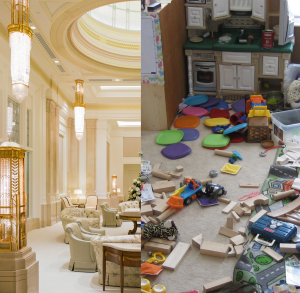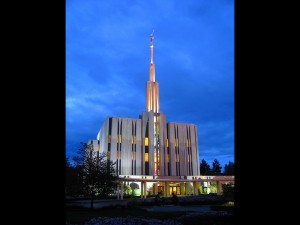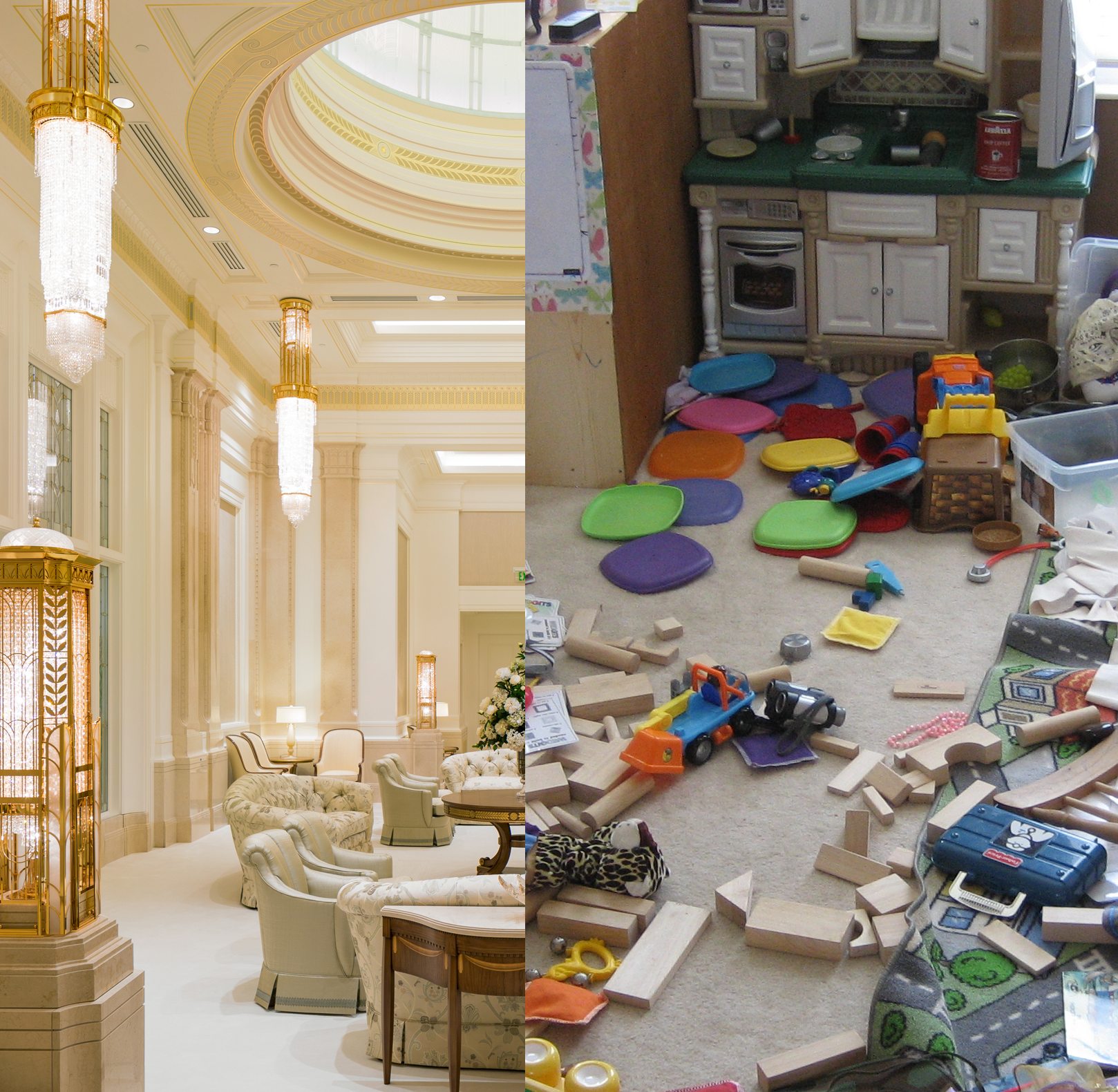The following is a talk which my wife gave in our ward last month.
I went to the temple last night. As I sat in the celestial room, it struck me how empty and quiet it was. It had been a very chaotic day. My morning had started with the sounds of screaming children pounding down the hall, followed by being jumped on in my bed by a toddler in a princess dress and a poopy diaper. I stepped on toys and books and small clothes. I heard the word “Mommy” somewhere in the neighborhood of a billion times. Our house is still in shambles from moving, mixed with the general chaos of children. Everywhere I looked there were endless signs of “people.” I had been inundated by sights, sounds, smells, animals, and moving bodies all day. By the time I got to the temple, I was completely overwhelmed. So it stands to reason that the celestial room would feel like heaven. While it was a welcome respite for a couple minutes, again, what struck me was how empty and quiet it was. In that moment, the idea that the celestial kingdom would be like that seemed as ridiculous as angels playing harps on clouds. God’s kingdom is about his family, and where there are many children, there is a lot of motion and sound and color, even when those children are adults. Some people have the advantage of being able to go to the temple with their whole family, and maybe it feels differently to them. My family was at home,  and I realized that I actually wanted to go back to my messy house to be with people I love rather than spend more than a few moments by myself on an empty sofa in a silent, empty room that is supposed to reflect eternity. What makes a place feel to me like what we’re ultimately aiming for is not a chandelier and a nice floral arrangement, but being with the people I care about in an environment where we can feel the spirit. That togetherness in Christ is what a temple is supposed to be for.
and I realized that I actually wanted to go back to my messy house to be with people I love rather than spend more than a few moments by myself on an empty sofa in a silent, empty room that is supposed to reflect eternity. What makes a place feel to me like what we’re ultimately aiming for is not a chandelier and a nice floral arrangement, but being with the people I care about in an environment where we can feel the spirit. That togetherness in Christ is what a temple is supposed to be for.
I’d like to read a familiar passage from D&C 88, or the Olive Leaf revelation.
119 Organize yourselves; prepare every needful thing; and establish a house, even a house of prayer, a house of fasting, a house of faith, a house of learning, a house of glory, a house of order, a house of God;
120 That your incomings may be in the name of the Lord; that your outgoings may be in the name of the Lord; that all your salutations may be in the name of the Lord, with uplifted hands unto the Most High.
123 See that ye love one another; cease to be covetous; learn to impart one to another as the gospel requires.
124 Cease to be idle; cease to be unclean; cease to find fault one with another; cease to sleep longer than is needful; retire to thy bed early, that ye may not be weary; arise early, that your bodies and your minds may be invigorated.
125 And above all things, clothe yourselves with the bond of charity, as with a mantle, which is the bond of perfectness and peace.
These passages immediately preceded the establishment of the school of the prophets, but some of these lines again appear in the dedication of the Kirtland temple. In other words, it doesn’t take an official temple to establish a house of faith, learning, or glory. The injunction was given to establish a house of God. The temple is, of course, a house of God. Our homes can, and should be, houses of God, too. This can be challenging, and our homes may not be ideal, but neither are the temples. The temple should be a place of learning, but I’m afraid I’ve learned many more lessons at home than I have in the temple. The temple should be a place of peace, but unfortunately the temple is a very painful place for some members of the church. The temple should be a place of refuge from sin. It probably is in the brief moment between when it’s dedicated and when the first person walks into it. The temple, like our homes, should be a place that binds families together, both through ordinances and the closeness that comes from worshipping together. However, differences in belief, poor use of agency, or misuse of the temple can actually damage families or pull them apart. My point is that the temple is not a magical building immune from the frailties of our telestial existence.
The temple is a building that we built and that WE dedicate to God. Dedicate means devotion and work. The dedication of a temple is a beginning, not the end. When we are confirmed members of the church, we are commanded to receive the Holy Ghost. It’s an ongoing task that we’re supposed to perform, not a passive guarantee that we don’t have to work at. I believe the same is true of the temple. It is up to us to make and keep the temple a place of order, love, learning, and faith. I have heard many times throughout my life that nothing bad can happen in the temple, and that you will always feel the spirit there. I can say with 100% sure knowledge that this notion is completely false. People who are unworthy do enter the temple, and people have done horrifyingly awful things in the temple. The scriptures are full of examples of bad behavior in temples, including idol worship, corrupt priests, wrongful performance of ordinances, greed, and destruction. The one instance we have in the scriptures of Christ getting really angry was when the temple needed a good cleansing. Interestingly, the glorious visitations that occurred on the Mount of Transfiguration happened in the wilderness, not in the temple which had been largely desecrated. The first vision happened in a grove, the first endowment happened in a store, Moses received the 10 commandments on mount Sinai, not in the tabernacle, and Nephi went into the mountain to receive revelation while Lehi seems to have primarily received it in bed.
I’m not trying to say the temple isn’t important. What I am suggesting is that the building is only as clean and holy as we keep it through ongoing, concerted effort. We have an important and sacred calling to keep the house of the Lord a place where he can reveal himself to his children in an ongoing way. The temple should not be stagnant, nor should we assume that it will remain peaceful and holy with no special effort on our part. We must be vigilant. Additionally, our temples do not need to be limited to the large buildings constructed by the church. With the same effort, we can dedicate our homes and make them places of learning, faith, and revelation.
Finally, God is not limited to bricks and mortar. Any place can be a sacred place. Not everyone can get to a temple on a regular basis, and not everyone finds peace in the temple, but that does not mean they cannot still find a sacred place to commune with God.
So, why the temple, then? I think the answer can be found in Alma 25:16.
16 Now they did not suppose that salvation came by the law of Moses; but the law of Moses did serve to strengthen their faith in Christ; and thus they did retain a hope through faith, unto eternal salvation, relying upon the spirit of prophecy, which spake of those things to come.
Nephi also taught the same thing:
23 For we labor diligently to write, to persuade our children, and also our brethren, to believe in Christ, and to be reconciled to God; for we know that it is by grace that we are saved, after all we can do.
24 And, notwithstanding we believe in Christ, we keep the law of Moses, and look forward with steadfastness unto Christ, until the law shall be fulfilled.
25 For, for this end was the law given; wherefore the law hath become dead unto us, and we are made alive in Christ because of our faith; yet we keep the law because of the commandments.
Even Christ himself, when he was baptized, did it to fulfil a commandment:
7 Know ye not that he was holy? But notwithstanding he being holy, he showeth unto the children of men that, according to the flesh he humbleth himself before the Father, and witnesseth unto the Father that he would be obedient unto him in keeping his commandments. (2 Ne 31:7)
By performing ordinances in the temple, we can show God that we will be obedient in keeping his commandments. We can access his power and receive tremendous blessings. We can be sealed together as families.
 However, I think it is important to remember that the temple and its ordinances is not like some celestial DMV where we have to check off all the boxes of heaven’s bureaucracy. The purpose of temple worship is to bring us to Christ. As we perform ordinances in the temple, on our minds should be Jesus Christ and his role as our Savior. Salvation comes through him, alone. There is no other way or means except through him. Like scriptures, prophets, prayer, church, and other avenues we’ve been given by God to access his spirit, the temple can be a powerful tool for finding Christ. The ordinances are promises we make that will help us become more like our Savior. They are beginnings, not ends, and in the end, it will still be by the grace of our Savior that we are saved.
However, I think it is important to remember that the temple and its ordinances is not like some celestial DMV where we have to check off all the boxes of heaven’s bureaucracy. The purpose of temple worship is to bring us to Christ. As we perform ordinances in the temple, on our minds should be Jesus Christ and his role as our Savior. Salvation comes through him, alone. There is no other way or means except through him. Like scriptures, prophets, prayer, church, and other avenues we’ve been given by God to access his spirit, the temple can be a powerful tool for finding Christ. The ordinances are promises we make that will help us become more like our Savior. They are beginnings, not ends, and in the end, it will still be by the grace of our Savior that we are saved.
I’d like to end where I began that the temple is about God’s family. I love how God shows his cards in D&C 19. He tells Joseph that
it is not written that there shall be no end to this torment, but it is written endless torment….For, behold, I am endless, and the punishment which is given from my hand is endless punishment, for Endless is my name. Wherefore—
11 Eternal punishment is God’s punishment.
12 Endless punishment is God’s punishment.
Eternal means Godly. Eternal punishment is God’s punishment. Eternal life, different from immortality, is Godly life. Eternal families, then, are Godly families. They are His family. A sealing can thwart death from ripping a mortal family apart, but only a family working together diligently with the help of Christ can make an eternal family. A sealing is a start and can give us access to power that will help us make our families eternal, but an eternal, Godly family requires work. God wants all of his children to be part of his family. He wants all of us to pull together. The binding together of families that we do in the temple should be drawing us to Christ and clothing us in the bonds of charity. It should help us reach out to each other across time, generations, cultures, and nations. We should make ourselves a part of God’s family, which is the eternal family. My testimony echoes Ammon when he said,

And now my brethren, we see that God is mindful of every people, whatsoever land they may be in; yea, he numbereth his people, and his bowels of mercy are over all the earth. Now this is my joy, and my great thanksgiving; yea, and I will give thanks unto my God forever. (Alma 26:37)
In the name of Jesus Christ, Amen.





Please thank your wife for this. I am sharing if you don’t mind. Thank you for sharing it with us.
My favorite part “I have heard many times throughout my life that nothing bad can happen in the temple, and that you will always feel the spirit there. I can say with 100% sure knowledge that this notion is completely false.”
Years ago (many) Satan appeared to the Logan, Utah temple president and said that he was going to stop the temple work there in Logan. During for the next 10 years (as I recall hearing the story), temple work really suffered. The temple president told Satan that he could not enter the temple; to which Satan replied that he would go in with the patrons.